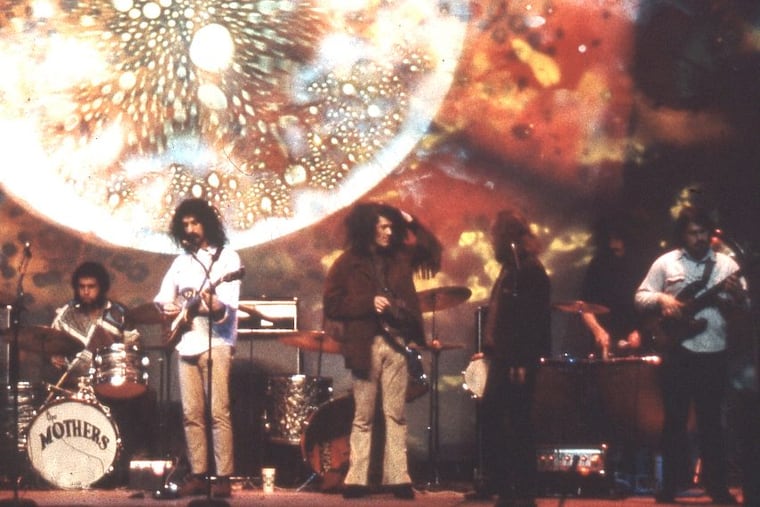Frank Zappa's obscure 'Yellow Shark' score is being performed in Philly
Orchestra 2001 plays selections from Frank Zappa's "The Yellow Shark" this Sunday at World Cafe Live. Hear more of it next weekend at the Fillmore Philly.

When armed with an electric guitar, the compulsively outrageous Frank Zappa radically redefined any pop musical genre that crossed his path. But classical?
The Yellow Shark, a collection of 17 orchestral works that he wrote and recorded shortly before his death in 1993, is driving Philly's modern-classical ensemble Orchestra 2001 to the edge of what seems possible.
The flexible Orchestra 2001 collective of players will grow its ranks to an unusually large 35 and is having 15 rehearsals — about four times as much as usual — for two Philly performances.
The first show, on Sunday at World Cafe Live, pairs selections from The Yellow Shark with works from some of Zappa's classical-music idols, including Pierre Boulez and Edgar Varèse. Music by those usually daunting names is easy compared to the Zappa works that will be mixed in.
Then on April 28, The Yellow Shark (named after a surfboard) will be performed almost in its entirety at the Fillmore Philadelphia, but with minimal rock-concert trappings since the players will need all the concentration they can muster.
These long-unpublished Zappa scores, says Orchestra 2001 music director Jayce Ogren, have rhythms that are "not possible for human beings to play together consistently." Zappa's melodies constantly take unexpected left turns over rhythms that are forever morphing, but end abruptly before going off into something else.
"There are all styles of writing, some with complicated rhythms — yes, many of those — some with a steady beat, some with no beat at all," Zappa said at a 1992 press conference. And if you don't like it, he quipped, "There's always Michael Jackson."
In touch with his Inner Zappa
"I'm trying to channel my Inner Zappa as best I can," said Ogren, not meaning to be glib. "I think of the notation as an imperfect picture of what the composer had in mind."
What stumps even the most savvy new-music conductors are the "tuplets" — time-stretching devices that, say, cram three notes into a space normally occupied by two. Ogren is puzzling over 23 notes mashed into 18 increments.
"There must be 50 spots like that," said Adam Lesnick, the orchestra's executive director. "One conductor said he needed a pocket calculator to figure it out."
Zappa's infatuation with modern classical composers began in his teen years in San Diego — so much that his parents ordered him not to play his noisy Varèse recordings outside his room. In 1957, Zappa wrote Varèse a chatty fan letter saying, "I think I may have something to offer you in the way of new ideas."
‘Newness personified’
Zappa was newness personified. His satirical persona — "I criticize everything," he said — kept him a proud outsider critic of American culture. But to serious listeners, he was one of the great guitarists and rock composers of his time, with intriguingly titled albums such as Hot Rats and Weasels Ripped My Flesh.
In the 1980s, he recorded two self-financed albums with the London Symphony Orchestra that left him frankly disappointed. Zappa needed specialists.
Following his 1990 cancer diagnosis, a more low-key Zappa was approached by the Frankfurt-based Ensemble Modern for a project that turned into the 1992 tour and live recording of The Yellow Shark. "There hasn't been anything that I've presented to them that they can't play," he said.
Some works were written on the now-obsolete electronic Synclavier, and were rewritten with the help of an outside orchestrator.
What's on the recording is not the same as what's written in the fresh scores sent to Philadelphia from the Germany-based publisher Schott Music. "A lot of things were created in the moment. … I'm not trying to replicate exactly what's on the recording," said Ogren. "I'm taking cues from it. My guess is that Zappa told the players to use their imagination."
An Exxon Valdez interlude
Not all selections on the album will be performed. The Zappa Family Trust discourages the outspoken, improvisatory "Food Gathering in Post-Industrial America 1992."
But Zappa won't be muted: His musical reaction to the 1989 Exxon Valdez oil spill, "Outrage at Valdez" (used in a Jacques Cousteau documentary), is very much present. It expresses its subject matter with what Ogren calls "a dark kind of groove … that doesn't let up."
It's one of the few Yellow Shark titles that makes sense. Others — "The Girl in the Magnesium Dress" and "Dog Breath Variations" — are taken less seriously. "Some are intended for shock value," said Ogren. "You have to acknowledge Zappa's political views and rebellious streak."
Behind the commentary, how much did Zappa the composer know what he was doing?
"He did have formal composition training at Pomona College, but it was a short time," said Ogren. "It's incredible the way he was able to understand the styles of great 20th-century composers and put them through the filter of his own personality. The fact that he was able to do that … is genius."